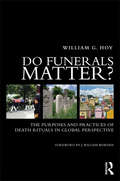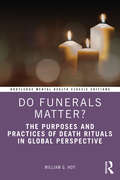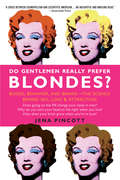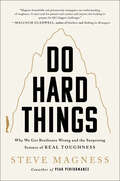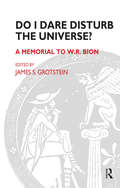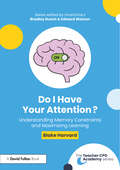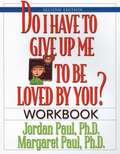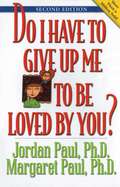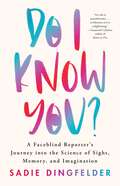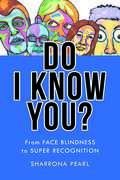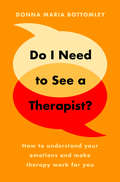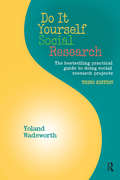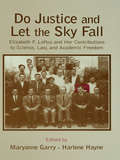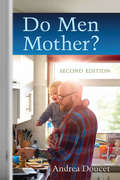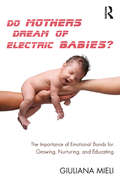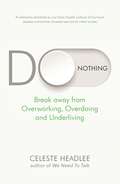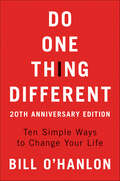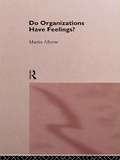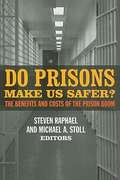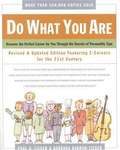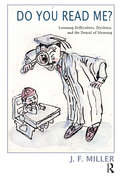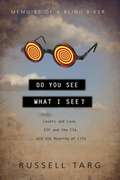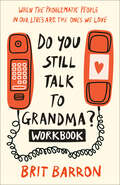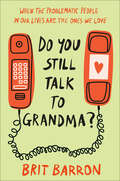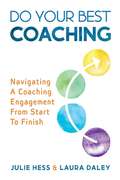- Table View
- List View
Do Funerals Matter?: The Purposes and Practices of Death Rituals in Global Perspective
by William G. HoyDo Funerals Matter? is a creative interweaving of historical, sociocultural, and research-based perspectives on death rituals, drawing from myriad sources to create a picture of what death rituals have been; and where, especially in the Western world, they are going. Death educators, researchers, counselors, clergy, funeral-service professionals, and others will appreciate the book’s theory- and research-based approach to the ways in which different cultural groups memorialize their dead. They will also find clear clinical and practical applications in the author’s exploration of the five ritual anchors of death-related ceremonial practice and help for professionals counseling the bereaved surrounding funerals. Based on nearly three decades of research and teaching on funeral rites, this volume promises to fill an important gap in the cross-cultural literature on bereavement, while answering an important question for our generation: Do funerals matter?
Do Funerals Matter?: The Purposes and Practices of Death Rituals in Global Perspective (Routledge Mental Health Classic Editions)
by William G. HoyDo Funerals Matter? is a creative interweaving of historical, sociocultural, and research-based perspectives on death rituals, drawing from myriad sources to create a picture of what death rituals have been; and where, especially in the Western world, they are going. The Classic Edition includes a new preface from the author reflecting on changes in the field since the book’s initial publication. Death educators, researchers, counselors, clergy, funeral-service professionals, and others will appreciate the book’s theory- and research-based approach to the ways in which different cultural groups memorialize their dead. They will also find clear clinical and practical applications in the author’s exploration of the five ritual anchors of death-related ceremonial practice and help for professionals counseling the bereaved surrounding funerals. Based on nearly four decades of research and teaching on funeral rites, this volume promises to fill an important gap in the cross-cultural literature on bereavement, while answering an important question for our generation: Do funerals matter?
Do Gentlemen Really Prefer Blondes? Why He Fancies You and Why He Doesn't
by Jena PincottQ: Do Gentlemen Really Prefer Blondes? A: Marilyn Monroe, Scarlet Johansson and Gwyneth Paltrow would be happy to know that they do. During the Ice Age, when even cavemen were in short supply, the blonde woman really did get her man - simply because her light coloured hair made her stand out. Plus scientists have recently discovered that natural blondes have higher oestrogen levels. In short, golden (preferably long) hair shouts : 'I am young, sexy - and fertile' to every member of the male species within a few miles. Q: When's the best time to seduce my man? A: Your other half will definitely get more possessive and more attracted to you when you're ovulating and at your most fertile. You'll spend time on your make-up and choose next day's outfit before you go to bed. Your lips will be fuller, and your skin will be radiant because of the high levels of oestrogen being pumped through your blood. But don't get carried away by how sexy you feel. You are also more likely to be unfaithful during this period and your boyfriend is also likely to run away with another equally fertile member of the female species. Q: How do I get him to change his wild lifestyle? A: Get pregnant. Shocking but true. Fathers have lower testosterone levels than single men which means that they are more easy-going and less confrontational, they take fewer life threatening risks, and they are far less likely to have an affair with the leggier, skinnier blonde from the office.
Do Hard Things: Why We Get Resilience Wrong and the Surprising Science of Real Toughness
by Steve MagnessNational Bestseller"In Do Hard Things, Steve Magness beautifully and persuasively reimagines our understanding of toughness. This is a must-read for parents and coaches and anyone else looking to prepare for life's biggest challenges." -- Malcolm Gladwell, author of Outliers and Talking to Strangers and host of the Revisionist History podcastFrom beloved performance expert, executive coach, and coauthor of Peak Performance Steve Magness comes a radical rethinking of how we perceive toughness and what it means to achieve our high ambitions in the face of hard things.Toughness has long been held as the key to overcoming a challenge and achieving greatness, whether it is on the sports field, at a boardroom, or at the dining room table. Yet, the prevailing model has promoted a mentality based on fear, false bravado, and hiding any sign of weakness. In other words, the old model of toughness has failed us.Steve Magness, a performance scientist who coaches Olympic athletes, rebuilds our broken model of resilience with one grounded in the latest science and psychology. In Do Hard Things, Magness teaches us how we can work with our body – how experiencing discomfort, leaning in, paying attention, and creating space to take thoughtful action can be the true indications of cultivating inner strength. He offers four core pillars to cultivate such resilience: Pillar 1- Ditch the Façade, Embrace RealityPillar 2- Listen to Your BodyPillar 3- Respond, Instead of React Pillar 4- Transcend Discomfort Smart and wise all at once, Magness flips the script on what it means to be resilient. Drawing from mindfulness, military case studies, sports psychology, neuroscience, psychology, and philosophy, he provides a roadmap for navigating life’s challenges and achieving high performance that makes us happier, more successful, and, ultimately, better people.
Do I Dare Disturb the Universe?: A Memorial to W.R. Bion (Maresfield Library)
by James S. GrotsteinAll the contributors to this compilation knew Bion personally and were influenced by his work. They include: Herbert Rosenfeld, Frances Tustin, Andre Green, Donald Meltzer and Hanna Segal.Wilfred R. Bion has taken his place as one of the foremost psychoanalysts of our time, yet it is only within recent years that the impact of his achievements are being felt. His death has stilled his pen and voice but demands a restatement of his view by those who have been most influenced by him. Bion's greatness lay, not only in the odd vertices of his incredible observations, but in the resources of his epistemological vastness, his respect for truth obtained in the disciplined absence of memory and desire, and his paying such scrupulous attention to and interpreting of recombinant constructions he achieved with mental elements their functions, and their transformations. His was the Language of Achievement, which is the tongue begotten by patience. Of note is his introduction of Plato's theory of forms and Kant's categories into psychoanalytic metapsychology, to say nothing of his mathematical, group and religious theories.
Do I Have Your Attention? Understanding Memory Constraints and Maximizing Learning (The Teacher CPD Academy)
by Blake HarvardDo I Have Your Attention? explores memory processing, how students learn, and offers practical guidance to help teachers tailor their instruction to be the most efficient and effective for learning.Drawing on evidence from cognitive science, Part I offers an easy-to-understand explanation of the process of memory and highlights certain barriers that hinder students’ ability to learn. Part II introduces over a century of research into two widely applicable learning strategies and, drawing on the author’s extensive teaching experience, demonstrates a plethora of classroom applications that maximize learning while working within the known constraints of human memory.Part of The InnerDrive Teacher CPD Academy series that offers a deep dive into the key areas that matter to teachers, this is essential reading for all teachers and school leaders who want evidence-based strategies which focus on impact in the classroom in sustainable and meaningful ways.
Do I Have to Give Up Me to Be Loved by You Workbook: Workbook - Second Edition
by Margaret Paul Jordan PaulA companion to the best-selling book of the same title, this popular, newly revised workbook helps couples create a deeply satisfying, more intimate relationship.A companion to the best-selling book of the same title, this popular, newly revised workbook helps couples create a deeply satisfying, more intimate relationship. Focusing on the ever-present dynamic of conflict-and the process of working through it-the authors guide couples in getting to the root of recurring disagreements and destructive behaviors. Self-assessment exercises and couple activities help readers recognize unloving responses, move past fear, identify self-protective and negative beliefs, break down power struggles, and reach out in forgiveness. The principles outlined in this powerful, easy-to-use workbook have helped thousands of couples and families create more loving relationships.Key features and benefitsa proven best-sellerhighly recommended by marriage therapistsincludes exercises for couples to explore core beliefs and values
Do I Have to Give Up Me to Be Loved by You: Second Edition
by Margaret Paul Jordan PaulThis classic text for couples interested in creating freer, more joyful, and profoundly intimate relationships explores the delicate balance of being true to oneself and being loved by another.Newly updated by the authors, here is the classic text for couples interested in creating freer, more joyful, and profoundly intimate relationships. In their best-selling book about couple relationships, Jordan Paul and Margaret Paul explore the delicate balance of being true to oneself and being loved by another. While couples think they are fighting about money, sex, or time, the authors reveal how such conflicts are almost always more deeply rooted and related to issues of self-protection. Offering a solid framework for conflict resolution, the authors guide couples in working through fears and false beliefs that can block the expression of loving feelings. Stories of couples and examples of dialogue validate readers- feelings and experiences.Key features and benefitsa proven best-sellerhighly recommended by marriage therapistsincludes exercises for couples to explore core beliefs and values
Do I Know You?: A Faceblind Reporter's Journey into the Science of Sight, Memory, and Imagination
by Sadie DingfelderAn award-winning science writer discovers she&’s faceblind and investigates the neuroscience of sight, memory, and imagination—while solving some long-running mysteries about her own life. Science writer Sadie Dingfelder has always known that she&’s a little quirky. But while she&’s made some strange mistakes over the years, it&’s not until she accosts a stranger in a grocery store (whom she thinks is her husband) that she realizes something is amiss. With a mixture of curiosity and dread, Dingfelder starts contacting neuroscientists and lands herself in scores of studies. In the course of her nerdy midlife crisis, she discovers that she is emphatically not neurotypical. She has prosopagnosia (faceblindness), stereoblindness, aphantasia (an inability to create mental imagery), and a condition called severely deficient autobiographical memory. As Dingfelder begins to see herself more clearly, she discovers a vast well of hidden neurodiversity in the world at large. There are so many different flavors of human consciousness, and most of us just assume that ours is the norm. Can you visualize? Do you have an inner monologue? Are you always 100 percent sure whether you know someone or not? If you can perform any of these mental feats, you may be surprised to learn that many people—including Dingfelder—can&’t. A lively blend of personal narrative and popular science, Do I Know You? is the story of one unusual mind&’s attempt to understand itself—and a fascinating exploration of the remarkable breadth of human experience.
Do I Need to See a Therapist?: How the fear of emotion keeps us struggling, and what to do about it
by Donna Maria BottomleyWhile society as a whole is becoming increasingly conscious of mental health, and the social consequences of the global Covid-19 pandemic has made the issue ever more salient, the idea of asking for professional help has largely remained taboo. The fear of being thought mad, weak or helpless, and the prospect of having to revisit personal trauma, have stopped many people from seeking out a therapist.In this empathetic and practical guide, drawing on some of the latest studies in the field, psychotherapist Donna Maria Bottomley examines these anxieties and argues that therapy should be just as acceptable as seeing a GP or booking your car into the garage, and needn’t be our last resort. Do I Need to See a Therapist? provides insight into how we can acknowledge and overcome the dual-fear of not only what we think it means about us if we see a therapist, but the fear of our own emotions themselves. The book provides a framework through which we can plot what is upsetting us, and lays out what to expect from therapy and how to make it work for us. The many pathways towards finding help, whether in a traditional practice setting or via alternate routes made possible by modern technology are also discussed, alongside a tool to help you choose between the many therapies on offer.
Do It Yourself Social Research: The Bestselling Practical Guide To Doing Social Research Projects
by Yoland WadsworthWith the rapid growth of collaborative, indigenous, and community-based research, one of the key challenges researchers face is finding an effective way of involving non-researchers in the research process. Do It Yourself Social Research has been a best-selling methodology guide for action research projects and community groups in Australia for almost three decades. Always emphasizing the importance of a spirit of inquiry, it demystifies the research process, covering where to start, how to manage a research project, what methods, techniques and resources to use, and interpretation, analysis and reporting. This third edition has been thoroughly revised, adding the use of narrative and dialogue in research, rich research design, and what digital technology can (and can’t) contribute to the research process. With its hands-on, no-nonsense approach, Do It Yourself Social Research is an essential resource for community groups, college students, and other novice researchers in health, social welfare, education and related areas.
Do Justice and Let the Sky Fall: Elizabeth F. Loftus and Her Contributions to Science, Law, and Academic Freedom (Psychology Press Festschrift Series)
by Maryanne Garry Harlene HayneFor more than 30 years, renowned psychological scientist Elizabeth F. Loftus has contributed groundbreaking research to the fields of science, law, and academia. This book provides an opportunity for readers to become better acquainted with one of the most important psychologists of our time, as it celebrates her life and accomplishments. It is intended to be a working text-one that challenges, intrigues, and inspires all readers alike. Do Justice and Let the Sky Fall collects research in theoretical and applied areas of human memory, provides an overview of the application of memory research to legal problems, and presents an introduction to the costs of doing controversial research. The first chapter gives a sketch of Loftus' career in her own words, and the remaining chapters color in that sketch. The final chapters of the book are more personal, and put a human face on a person who is held in such high esteem. This multipurpose volume is intended to serve as a valuable resource for established scientists, emerging scientists, graduate students, lawyers, and health professionals.
Do Men Mother?: Second Edition
by Andrea DoucetThe second edition of Andrea Doucet’s Do Men Mother? builds upon the award winning first edition to further illuminate fathers' candid reflections on caring and the intricate social worlds that men and women inhabit as they ‘love and let go’ of their children. Including interviews with over one hundred fathers – from truck drivers to insurance salesmen, physicians to artists – Doucet illustrates how men are breaking the mould of traditional parenting models. This edition expands her argument wider and deeper, building on changes to the theoretical work that informs the field, her own intellectual trajectory, and the fieldwork of revisiting six fathers and their partners a decade after her initial interviews. She continues to examine key questions such as: What leads fathers to trade earning for caring? How do fathers navigate through the 'maternal worlds' of mothers and infants? Are men mothering or are they redefining fatherhood? In asking and unravelling the question ‘Do men mother?’ this study tells a compelling story about Canadian parents radically re-envisioning child care and domestic responsibilities in the twenty-first century.
Do Mothers Dream of Electric Babies?: The Importance of Emotional Bonds for Growing, Nurturing, and Educating
by Giuliana MieliWe live in a society that ignores and disregards attachment needs and feelings. Starting from this consideration, the author describes the stages of human emotional development in a lucid narrative which is both scientifically rigorous and grounded in clinical examples. Mieli critically investigates the origins of a specific weariness towards feelings which is reflected in the history of Western philosophy and science, resulting in a cultural disregard of emotional needs. The book powerfully suggests that if undeterred, this disregard may lead to severe consequences for the future of our society. Research compellingly shows that responding to fundamental emotional needs is a psycho-biological requirement necessary for human wellbeing and survival itself. Mieli contends that its oversight has a counterpart in the dramatic rise of mental distress in contemporary society, as well as in the difficulties that are increasingly encountered around maternity, fertility, and parenting.
Do Nothing: Break Away from Overworking, Overdoing and Underliving
by Celeste HeadleeWe work feverishly to make ourselves happy. So why are we so miserable? This manifesto helps us break free of our unhealthy devotion to efficiency and shows us how to reclaim our time and humanity with a little more leisure.'This book is so important and could truly save lives . . . With intelligence and compassion, Headlee presents realistic solutions for how we can reclaim our health and our humanity from a technological revolution that seems hell-bent on destroying both. I'm so grateful to have read this book. It delivers on its promise of a better life' - Elizabeth Gilbert, bestselling author of Big Magic and Eat, Pray, LoveDespite our constant search for new ways to 'hack' our bodies and minds for peak performance, human beings are working more instead of less, living harder not smarter, and becoming more lonely and anxious. We strive for the absolute best in every aspect of our lives, ignoring what we do well naturally. Why do we measure our time in terms of efficiency instead of meaning? Why can't we just take a break?In Do Nothing, award-winning journalist Celeste Headlee illuminates a new path ahead, seeking to institute a global shift in our thinking so we can stop sabotaging our well-being, put work aside and start living instead of doing. The key lies in embracing what makes us human: our creativity, our social connections (Instagram doesn't count), our ability for reflective thought, and our capacity for joy. Celeste's strategies will allow you to regain control over your life and break your addiction to false efficiency, including:-Increase your time perception and determine how your hours are being spent. -Stop comparing yourself to others.-Invest in quality idle time. Take a hot bath and listen to music.-Spend face-to-face time with friends and familyIt's time to recover our leisure time and reverse the trend that's making us all sadder, sicker, and less productive.
Do One Thing Different: Ten Simple Ways to Change Your Life
by Bill O'Hanlon“If you do one thing different, read this book! It is filled with practical, creative, effective, down-to-earth solutions to life’s challenging problems.” —Michele Weiner-Davis, bestselling author of Healing from InfidelityTired of feeling stuck all the time when you’re trying to solve a problem or are facing conflict? Do you get easily flustered or angry when a negative confrontation arises? Have you ever wished you could communicate more easily with your spouse, kids, colleagues, or anyone else you have a difference in opinion with? In this newly updated edition of Do One Thing Different, Bill O’Hanlon will arm you with his ten easy Solution Keys so that you can move quickly from “stuck” to “smooth sailing” in all aspects of your life. Humorous, direct, and—most important of all—effective, these keys will help you change how you view and “do” your problems—from difficult relationships to enhancing sexuality and resolving conflicts of all kinds. The next time you have a problem, try one of these Solution Keys:Break Problem Patterns: Change any one of what you usually do in the problem situation by doing one thing different! Example: If you usually get angry and defensive, sit quietly and listen.Find and Use Solution Patterns: Import solutions from other situations where you felt competent. Example: What do you say to resolve a problem with an angry customer that you don’t say to your angry partner?Shift Your Attention: Focus on what you would like to have happen rather than on what is happening.Grounded in therapeutic practice, Do One Thing Different will put you back in control of your emotions and your life.
Do Organizations Have Feelings?
by Martin AlbrowDo Organisations have Feelings? argues that any adequate explanation of the way organizations function for those engaged in business and those who study it must transcend the traditional divide between reason and emotion. The papers in this important collection by one of the leading world authorities in the studies of organizations were written over a period of thirty years. They are now presented together for the first time with an extended commentary and discussion by the author and two specially written chapters to bring the story right up-to-date. Together they provide a fascinating history of the way organizations have reflected changes in society at large as we move into the epoch of globalisation.
Do Prisons Make Us Safer?: The Benefits And Costs Of The Prison Boom
by Steven Raphael Michael A. StollThe number of people incarcerated in U. S. prisons and jails more than quadrupled between 1975 and 2005, reaching the unprecedented level of over two million inmates today. Annual corrections spending now exceeds 64 billion dollars, and many of the social and economic burdens resulting from mass incarceration fall disproportionately on minority communities. Yet crime rates across the country have also dropped considerably during this time period. In Do Prisons Make Us Safer? leading experts systematically examine the complex repercussions of the massive surge in our nation's prison system. Do Prisons Make Us Safer? asks whether it makes sense to maintain such a large and costly prison system. The contributors expand the scope of previous analyses to include a number of underexplored dimensions, such as the fiscal impact on states, effects on children, and employment prospects for former inmates. Steven Raphael and Michael Stoll assess the reasons behind the explosion in incarceration rates and find that criminal behavior itself accounts for only a small fraction of the prison boom. Eighty-five percent of the trend can be attributed to "get tough on crime" policies that have increased both the likelihood of a prison sentence and the length of time served. Shawn Bushway shows that while prison time effectively deters and incapacitates criminals in the short term, long-term benefits such as overall crime reduction or individual rehabilitation are less clear cut. Amy Lerman conducts a novel investigation into the effects of imprisonment on criminal psychology and uncovers striking evidence that placement in a high security penitentiary leads to increased rates of violence and anger--particularly in the case of first time or minor offenders. Rucker Johnson documents the spill-over effects of parental incarceration--children who have had a parent serve prison time exhibit more behavioral problems than their peers. Policies to enhance the well-being of these children are essential to breaking a devastating cycle of poverty, unemployment, and crime. John Donohue's economic calculations suggest that alternative social welfare policies such as education and employment programs for at-risk youth may lower crime just as effectively as prisons, but at a much lower human cost. The cost of hiring a new teacher is roughly equal to the cost of incarcerating an additional inmate. The United States currently imprisons a greater proportion of its citizens than any other nation in the world. Until now, however, we've lacked systematic and comprehensive data on how this prison boom has affected families, communities, and our nation as a whole. Do Prisons Make Us Safer? provides a highly nuanced and deeply engaging account of one of the most dramatic policy developments in recent U. S. history.
Do What You Are: Discover The Perfect Career For You Through The Secrets Of Personality Type (3rd Edition)
by Barbara Barron-Tieger Paul D. TiegerDo What You Are has already helped more than half a million people find truly satisfying work. After helping you discover your Personality Type, it provides real-life case studies of people who share your Type and introduces you to the key ingredients your work must have for it to be truly fulfilling. Whether you're a recent college graduate, job seeker, or mid-life career switcher, this lively guide will help you discover the right career for you. Using workbook exercises and explaining specific job-search strategies, Do What You Are lists occupations that are popular with your Type and offers a rundown of your work-related strengths and weaknesses. It also shows, step by step, how to use your unique strengths to customize your job search, ensuring the best results in the shortest period of time. This time-honored classic has been updated to include jobs in today's hottest growing markets, such as e-commerce, biotechnology, new media, and telecommunications.
Do You Read Me?: Learning Difficulties, Dyslexia and the Denial of Meaning
by J.F. MillerA fascinating and compelling exploration of the learning process for parents, teachers, and anyone with an interest in education. Reading and writing are fundamentally about the communication of meaning. Yet, when a child has difficulty in learning to read and write, the one area that is never seen as having any relevance is the child's life experiences. The author's contention is that the concept of dyslexia is something that has been invented, rather than discovered, in order to evade the question of meaning and the understanding of the individual. Based on the author's thirty years' experience of both educational psychology and analytical therapy, the book sets out a radical approach to learning difficulties in which the primary assumption is that there will usually be underlying emotional conflicts, tensions, and anxieties. Any learning disability is thus more likely to be the symptom of less-evident, personal difficulties, rather than a problem in itself. The book examines, with examples, typical patterns of personal and emotional difficulty that give rise to learning problems.
Do You See What I See? Memoirs of a Blind Biker
by Russell TargTarg has been visually handicapped since childhood and yet he has performed groundbreaking research in lasers and optics. This book provides the remarkable story of a visually impaired physicist who sees beyond perception to help readers find meaning and joy.
Do You Still Talk to Grandma? Workbook: When the Problematic People in Our Lives Are the Ones We Love
by Brit BarronWith this incredible workbook, renowned motivational speaker, teacher, and storyteller Brit Barron will guide you in the emotional work of holding on to your deepest convictions without giving up on the people you love.The Do You Still Talk to Grandma? Workbook is a practical and deeply researched guide to understanding the psychological and emotional dynamics that lead us away from constructive disagreement and into binary moral judgments of heroes and villains—and to the steps we must take if we are to transcend groupthink and transform our relationships.In this companion to Brit Barron&’s Do You Still Talk to Grandma?, you will learn to recognize behavioral patterns online and in yourself that cause social justice efforts to become toxic. You&’ll practice new emotional and thought habits that will help you to be responsive instead of reactive. Through insightful and provocative writing prompts, you&’ll discover how to • identify cognitive splitting• notice when group belonging competes with individual values• make sense of &“internet brain&”• navigate the difference between consequences and punishmentFor anyone who wants to move beyond the conflict between moral conviction and close relationships with people whose views are problematic, the Do You Still Talk to Grandma? Workbook is an essential guide for the concrete actions we can take toward transformative justice in our everyday lives.
Do You Still Talk to Grandma?: When the Problematic People in Our Lives Are the Ones We Love
by Brit BarronRenowned motivational speaker, teacher, and storyteller Brit Barron offers a path to holding on to our deepest convictions without losing relationships with the people we love.&“This book is so needed in a time when we are fresh off cancel culture and ready for a new way to process and interact with those with whom we don&’t agree—whether virtually or in real life.&”—Joy Cho, author and founder of Oh Joy!Brit Barron gets it. Those people who hurt us with their bigotry and ignorance . . . they&’re often the people we love: They&’re our friends, our parents, our grandparents, and even our religious leaders. And what we want is for them to grow, not to be canceled by an online mob. So what can it look like to strive for justice without causing new harm or giving up on the people we love? Barron shows that the way forward is to create a gracious and risky space for people to learn and evolve. We need to form the sorts of relationships where we can tell difficult truths, set boundaries, forgive, and share stories of our own failings. And this starts with examining ourselves.In Do You Still Talk to Grandma?, Barron draws readers into this tension between relationship and accountability, sharing painful experiences from her own life, such as her parents&’ divorce and belonging to a faith community that sided with the forces that dehumanize BIPOC and LGBTQ+ folks. Barron illuminates the challenges and hope for these relationships, showing that the best research points toward humility, self-awareness, an openness to learning, and remembering that others can learn too.Barron envisions a redemptive way of being that allows progressives to love people who say or believe problematic things without sacrificing themselves, their values, or their beliefs. Provocative, charming, and vulnerable, Do You Still Talk to Grandma? is an essential read for anyone struggling to live compassionately without giving up on conviction.
Do Your Best Coaching: Navigating a Coaching Engagement From Start To Finish
by Julie Hess Laura DaleyEngaging and accessible, Do Your Best Coaching offers coaches a framework and tools to carry out a healthy coaching engagement from start to finish. Experienced executive coaches Laura Daley and Julie Hess walk readers through a full coaching engagement using the four phases of their Intentional Engagement Framework: 1) Creating the Container 2) Establishing the Through Line 3) Making Progress, and 4) Ending with Meaning They provide field-tested tools, practices and structures for each phase, and conclude with insight into developing the most important tool in your coaching toolkit: you! Using stories and examples that the authors pull from their own experience as well as dozens of colleague interviews, Do Your Best Coaching illustrates how to handle the many challenges, questions, and sticky situations coaches may encounter during an engagement. Do Your Best Coaching offers the opportunity to learn best practices from many of the top coaches in the field, and the encouragement to shift from habitual to intentional practices. Easily adaptable for each unique coaching context, Do Your Best Coaching offers new and seasoned coaches alike the practical tools and the experiential wisdom they need to do their best coaching.
